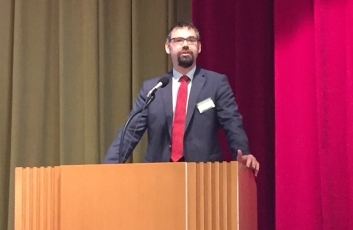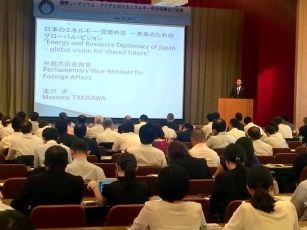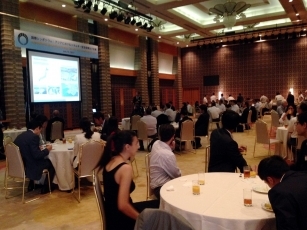Press Releases
International Symposium: Energy Security and Investment in Asia
July 13, 2017



- On July 13th, the Ministry of Foreign Affairs hosted "International Symposium: Energy Security and Investment in Asia" at Mita Conference Hall with more than 200 participants including Motome Takisawa, Paliamentary Vice-Minister for Foreign Affairs, Mr. Laszlo Varro, chief economist of the International Energy Agency (IEA), and other energy experts, government representatives, company representatives, researchers, members of diplomatic corps in Tokyo, and media personnel.
- Parliamentary Vice-Minister Takisawa opened the symposium with the Policy Speech on energy and resource diplomacy of Japan by Fumio Kishida, Minister for Foreign Affairs titled "Energy and Resource Diplomacy of Japan - global vision for a shared future. (PDF)
 " In this speech, Mr. Takisawa presented the vision and strategy for Japan's future energy and resource diplomacy under current cataclysmic change in global energy landscape. In specific, while recognizing the paramount importance of ensuring stable supply of energy and resourse to Japan, based on principle that Japan's energy security will be enhanced through its contribution in providing solutions for global energy challenges and in promoting mutual interests between Japan and resource-rich countries, Mr. Takisawa presented three pillars of Japan's energy and resource diplomacy; namely, i) strengthening a strategic approach to energy and resource issues in Japan's diplomacy, ii) taking a multi-layered approach when conducting energy and resource diplomacy so that Japan can catar to various needs, and iii) consolidating "Japan's unique strength" in the energy and resource fields.
" In this speech, Mr. Takisawa presented the vision and strategy for Japan's future energy and resource diplomacy under current cataclysmic change in global energy landscape. In specific, while recognizing the paramount importance of ensuring stable supply of energy and resourse to Japan, based on principle that Japan's energy security will be enhanced through its contribution in providing solutions for global energy challenges and in promoting mutual interests between Japan and resource-rich countries, Mr. Takisawa presented three pillars of Japan's energy and resource diplomacy; namely, i) strengthening a strategic approach to energy and resource issues in Japan's diplomacy, ii) taking a multi-layered approach when conducting energy and resource diplomacy so that Japan can catar to various needs, and iii) consolidating "Japan's unique strength" in the energy and resource fields. - After that, Laszlo Varro, chief economist of IEA, made a keynote speech on "World Energy Investment 2017" published by IEA on July 11th. He noted that global energy investment fell by 12% in 2016, the second consecutive year of decline, and electricity sector investment overtook upstream investment including oil and gas for the first time. He also stated that half of global energy investment was concentrated in China, United States and Europe; US Shale investment increased by 50% in 2016 during stagnation of global upstream investment, and the public sector including the state-owned enterprises increased its roles in energy investment. Furthermore, he highlighted that investment on electrification of transport and heat sector tended to increase and storage of electrical power was one of the promising investment fields but their chance of success largely depend on policy factors such as government regulation and market design.
- These two speeches were followed by lively discussion by Japanese and foreign energy experts on energy security, transparent energy market and energy investment in Asia with latest studies and surveys, taking into account the recent changes of global energy landscape. Through the discussion, they highlighted the following points; i) energy policies in Asia where is regarded as the driving force of global energy demand, will impact greatly on the future global energy landscape, ii) development and investment on clean energy technology will be emphasized with growing importance of promoting cleaner use of all available energy resources including renewables and fossil fuels to achieve climate change challenges and economic growth, and iii) regional cooperation on effective use of energy resoureces needs to be enhanced through strengthening bitaleteal and multilateral governmental dialogues towards the regional collaboration on developing LNG market hub in Asia and regional integrity of energy infrastructure such as regional power grid and pipelines in Asia.
- At the Lunch Reception, a presentation on the high efficiency Integrated coal Gasification Combined Cycle (IGCC) power plants, which is one of the advanced technologies in Japan, was made. Ingrediens and food products from Fukushima, Kumamoto and recent disaster-affected areas in the northern Kyushu were also served to the participants. This promoted Japnan's cutting-edge technology, food safety and reconstruction to participants especially from overseas.
- At this symposium, the practical and useful knowledge was shared through specialized and concrete discussion on various energy topics such as ensuring energy security in Asia, challenges towards developing global LNG market and roles of advanced energy technology and investment towards realizing a low carbon society, taking into account the current situations and opportunities in the changing international energy landscape. This symposium provided opportunities to many participants from the public and private sectors for networking among people involved in energy areas, both Japanese and those from overseas.

